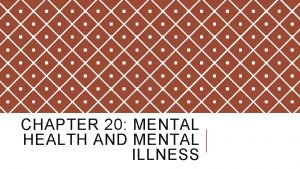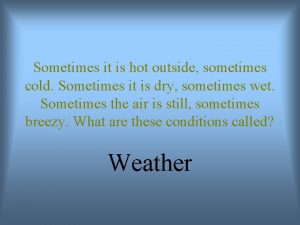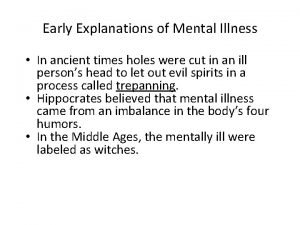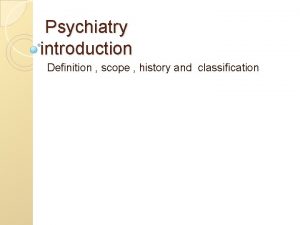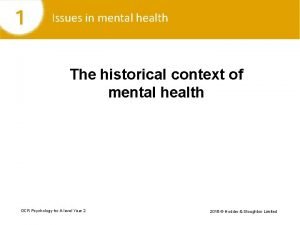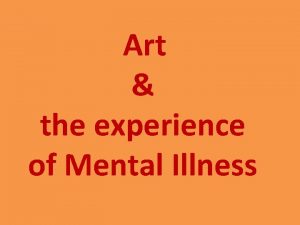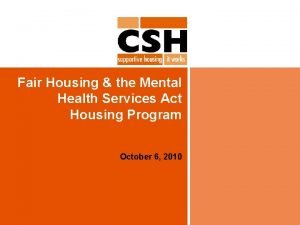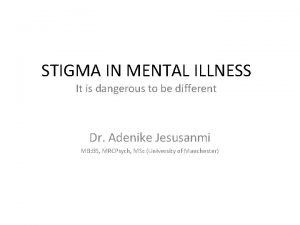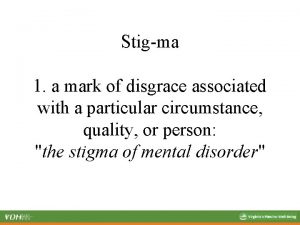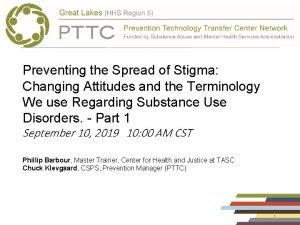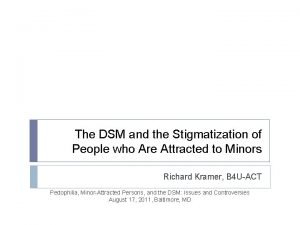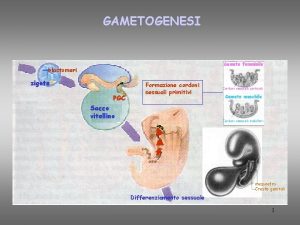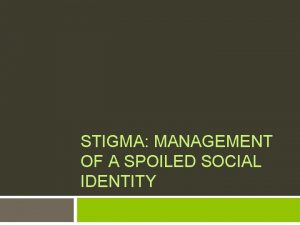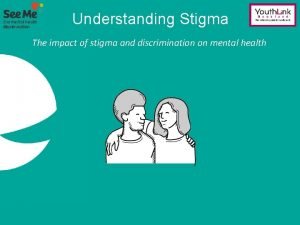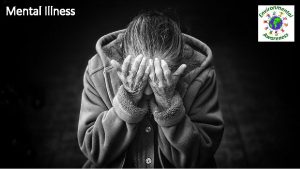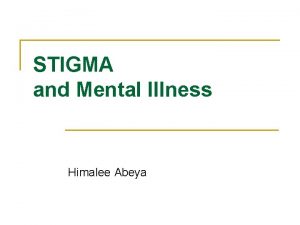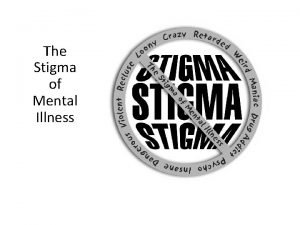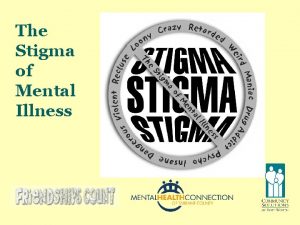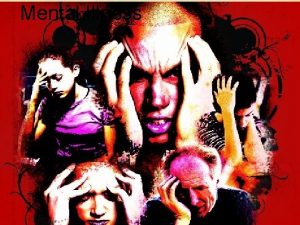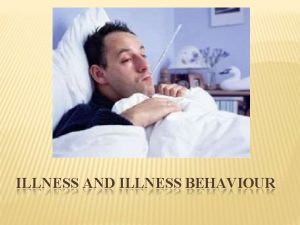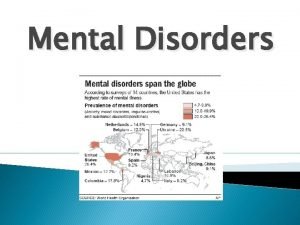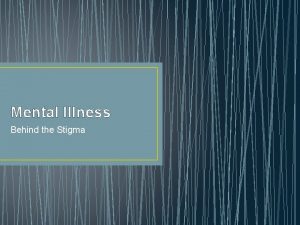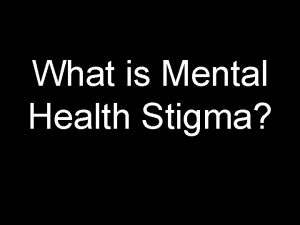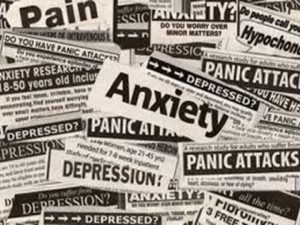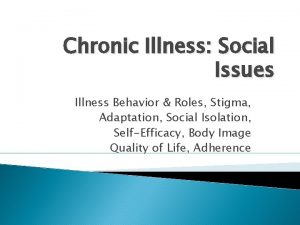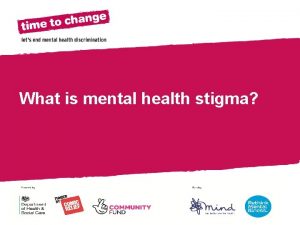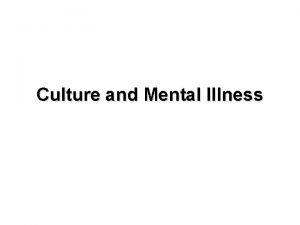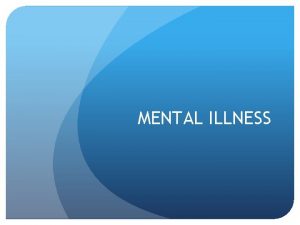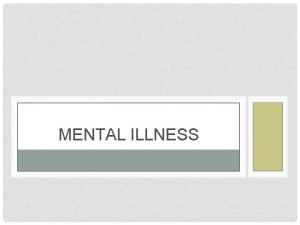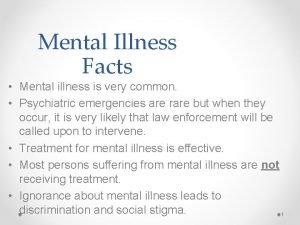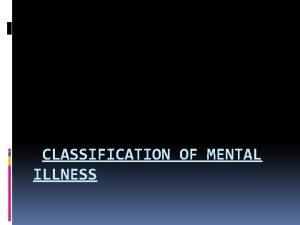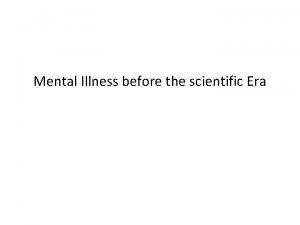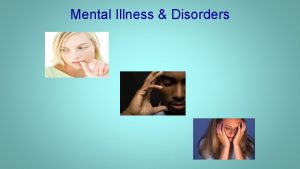The issue of stigma against mental illness sometimes
































- Slides: 32

“The issue of stigma against mental illness sometimes feels like the worst part about it. ” Tom

Friends They don’t call me sad. me bad. me mad. me. © William Mc. Knight

Discrimination and how to reduce it Graham Thornicroft g. thornicroft@iop. kcl. ac. uk World Health Organisation Collaborating Centre

Sources • Review: 1615 international stigma published sources • Detailed statements / testimonies from people with severe mental illness in South London (n=40) • Statements about discrimination from INDIGO Study (722 people with a diagnosis of schizophrenia in 29 countries)

What is Stigma? • Problem of knowledge = Ignorance • Problem of attitudes Prejudice = • Problem of behaviour = Discrimination

Key Features of Stigma Research • • • Focus on violence & media Mostly only address schizophrenia Little attention to emotions Little information on actual discrimination Few reports from service users Few intervention studies

1. Discrimination at Home • Adverse reactions by family eg lazy / weak • Negative reactions to family members • High rates of homelessness • Neighbourhood reactions to residential care

“At 16, in 1996, I suffered a bad mental breakdown where I was hospitalised for 5 years. It was very traumatic. There I was, the eldest son, suffering a sudden deep depression, crying and unable to work, often threatened by my confused Dad as being “weak”. Robert

2. Discrimination in Friendships, Intimate Relationships and Childcare • Loss of husband/wife/partner • Disappearance of friends • Impaired long-term sexual relationships

“When I got sick for the first time I was seventeen and I was at high school. My behavior was awkward and my friends and classmates were making fun of me. I was feeling really bad about this. Then I was hospitalised. When they found out about this, they all abandoned me. I lost my friends. ” Paul

3. Discrimination at Work • Lower rates of short-listing and hiring • More often sacked • Lower rates of pay • Poorer promotion prospects • Dilemma: conceal or disclose

4. Discrimination in Social Life • Less access to affordable insurance • Limitation on jury service, property ownership, legal ability to sign contracts • Not taken as a reliable witness • Human rights may be fundamentally limited • May be negative trends for attitudes

“ My illness, depression and stress, has been exacerbated by my debt problem. As a result I cannot get well enough to go back to work to earn money to pay the debts. ” Sonia

5. Discrimination in Healthcare • Avoidance of seeking help for fear of stigma • Pessimism of mental health care staff • Worse physical care: ‘diagnostic overshadowing’

Healthcare and Discrimination • strong evidence that people with mental illness have less access to primary health care • receive inferior care for diabetes, heart attacks • even though rates of cardio-vascular disease, obesity, diabetes are higher for people with mental illness • Druss B G, Bradford D W, Rosenheck R A, Radford M J, Krumholz H M. Mental disorders and use of cardiovascular procedures after myocardial infarction. JAMA 2000; (283): 506511

“Some of the worst experiences I have had have been in psychiatric hospitals …often I have felt that my rights and dignity have been stripped away. Being intimately searched again and constantly followed whilst under ‘close observation’ just leaves me feeling singled out and perceived as little more than a nuisance. After I have self-harmed, just when I feel at my most vulnerable, I’ve heard many comments along the lines of “Oh she’s cut herself again, why doesn’t she just do it properly and kill herself. ” Sandra

6. Discrimination in the Media • Newspapers: 40 -70% of items: violence • 85% of children's animations show characters with mental illness • Few direct accounts from consumers • Clear negative effects on popular views

7. Anticipated Discrimination • Similar ideas: self-stigma, selfdiscrimination • Avoidance of important actions: eg – applying for a job – seeking a close relationship – because of previous failure or – in anticipation of failure

“I have a friend who is very stigmatising when he talks about people with mental illness. For this reason I hide my problem. I know that if he knew about me he would break up our friendship. ” Alexandros

Evidence of How to Reduce Discrimination

Local Level Interventions

Social Contact Theory • Bogardus 1924 • Direct, personal contact with individual(s) of stigmatised group • Equal status (eg co-facilitator)

National Level Interventions

National Campaigns • Australia • New Zealand • Scotland

Australia: beyondblue Aim: campaign for better knowledge of depression Method: states using beyondblue compared with rest Results: more improvement in high-exposure states: – for recognition of depression – about the benefits of help-seeking – in beliefs on counselling & medications Source: Jorm AF et al Aust N Z J Psychiatry 2005; 39(4): 248 -254

New Zealand: Like Minds Like Mine • National media campaign vs. stigma & discrimination • Increase in reported acceptance of people with mental illness in general • But attitudes towards people with schizophrenia remained virtually unchanged • Maori and Pacific people did not show the same improvement in attitudes

New Zealand Campaign • 4 series of television advertisements • for example…

John Kirwan: New Zealand Rugby Legend > > Featured in the National Depression Initiative National survey showed 78% recalled the advertisements Of these 98% were positive about them Personal honesty & openness key factors in campaign success

New Campaign in England • ‘Moving People’ • £ 18 m. programme over 4 years • national level social marketing • local level activities • based on ‘social contact’ theory

Advocate against the Mental Health Treatment Gap

The treatment gap in mental health care Robert Kohn, Shekhar Saxena, Itzhak Levav & Benedetto Saraceno Bulletin of the World Health Organization 2004; 82: 858 -866 • • • Median treatment gap (untreated % of cases): schizophrenia & related psychoses 32% depression 56% dysthymia 56% bipolar disorder 50% panic disorder 55% GAD 57% OCD 57% alcohol abuse and dependence 78%

Thornicroft G 2006 Shunned: discrimination against people with mental illness Oxford University Press Oxford
 Mental illness mental health jeopardy
Mental illness mental health jeopardy Mental health and mental illness chapter 20
Mental health and mental illness chapter 20 Sometimes cold sometimes hot
Sometimes cold sometimes hot They say it only takes a little faith to move a mountain
They say it only takes a little faith to move a mountain Sometimes you win some
Sometimes you win some Sometimes sweet sometimes sour
Sometimes sweet sometimes sour Mental illness in ancient times
Mental illness in ancient times Americanization of mental illness
Americanization of mental illness Personality disorder vs mental illness
Personality disorder vs mental illness Classification of mental disorders
Classification of mental disorders Historical views of mental illness psychology ocr
Historical views of mental illness psychology ocr Mark rothko mental illness
Mark rothko mental illness Ksi depression
Ksi depression Fair housing act mental illness
Fair housing act mental illness Catherine earnshaw mental illness
Catherine earnshaw mental illness What is stigma
What is stigma Stigma bunga
Stigma bunga Stigma is a mark of disgrace
Stigma is a mark of disgrace Stigma definition
Stigma definition Stigma image
Stigma image Stigma ovaio
Stigma ovaio Disidentifiers
Disidentifiers Diagram of germination of pollen on stigma
Diagram of germination of pollen on stigma What is stigma
What is stigma Associatief stigma
Associatief stigma Stigma definition
Stigma definition Fruits and seeds formation
Fruits and seeds formation Hypocotyl
Hypocotyl Stigma goffman spiegazione
Stigma goffman spiegazione Tribal stigma
Tribal stigma Sigma notation
Sigma notation Inc
Inc Parts of the root
Parts of the root

